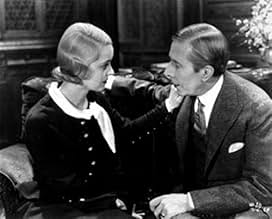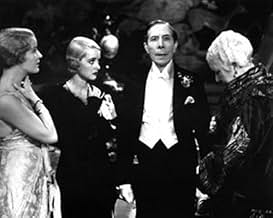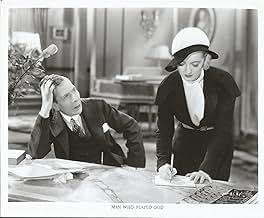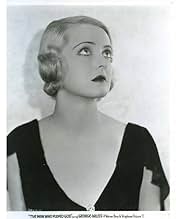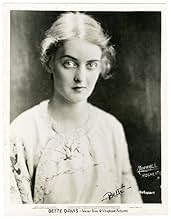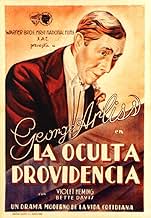IMDb-BEWERTUNG
6,8/10
1350
IHRE BEWERTUNG
Füge eine Handlung in deiner Sprache hinzuAfter losing his hearing, a musician uses lip-reading to help others.After losing his hearing, a musician uses lip-reading to help others.After losing his hearing, a musician uses lip-reading to help others.
- Auszeichnungen
- 1 wins total
George Arliss
- Montgomery Royle
- (as Mr. George Arliss)
André Luguet
- The King
- (as Andre Luguet)
Ivan F. Simpson
- Battle
- (as Ivan Simpson)
Charles E. Evans
- The Doctor
- (as Charles Evans)
Fred Howard
- Man
- (Gelöschte Szenen)
Symona Boniface
- Woman in Audience
- (Nicht genannt)
Wade Boteler
- Detective
- (Nicht genannt)
Elspeth Dudgeon
- Would-Be Ticket Buyer
- (Nicht genannt)
Grace Durkin
- Kit - First Girl
- (Nicht genannt)
Helena Phillips Evans
- Music Fan with Boy
- (Nicht genannt)
Empfohlene Bewertungen
I get so sick of people claiming that Bette Davis wasn't a beauty. She is so lovely in this 1932 film - those huge, gorgeous blue eyes, radiant smile, cute figure - she looks like a doll.
This is a wonderful melodrama which was re-made with, of all people, Liberace years later as "Sincerely Yours." All I can remember about the Liberace film is that he soft-shoed off the stage at the end, and I have a vague impression of him starting to go deaf while playing the piano.
If you can get past that the embalmed-looking George Arliss is supposed to be only 50 years old in this film (he was 64 and looks 80), it should be clear sailing from then on. Arliss was a marvelous actor, and his strong theatrical training is obvious here, as is Davis', with her clipped voice and large gestures. Film as a medium was still being learned by these actors who came from theater.
Man Who Played God is a truly beautiful story about a world-famous pianist who goes deaf and turns against his music and his religious beliefs, only to discover that every tragedy in life has meaning. 73 years later, it's still a great life lesson.
Look for Ray Milland in an uncredited role.
This is a wonderful melodrama which was re-made with, of all people, Liberace years later as "Sincerely Yours." All I can remember about the Liberace film is that he soft-shoed off the stage at the end, and I have a vague impression of him starting to go deaf while playing the piano.
If you can get past that the embalmed-looking George Arliss is supposed to be only 50 years old in this film (he was 64 and looks 80), it should be clear sailing from then on. Arliss was a marvelous actor, and his strong theatrical training is obvious here, as is Davis', with her clipped voice and large gestures. Film as a medium was still being learned by these actors who came from theater.
Man Who Played God is a truly beautiful story about a world-famous pianist who goes deaf and turns against his music and his religious beliefs, only to discover that every tragedy in life has meaning. 73 years later, it's still a great life lesson.
Look for Ray Milland in an uncredited role.
First and foremost, "The Man Who Played God" (1932) is not a Bette Davis vehicle. She was still a few years away from receiving top billing and graduating into 'A' pictures. However, the mere fact that she's in this overlooked and forgotten film will only push it into wider circulation and rapidly increase its number of viewers. So much has already been said about her, there's very little one can add to further compliment her. Personally, I think she gave some of her best performances in these early 1930s B programmers for Warner Bros. Sure, the material wasn't nearly as good, which only made her performances stand out all the more. But Bette Davis has little to do with what stands out about this movie.
After losing his hearing, a well-loved and respected piano player (George Arliss) becomes a recluse. He rejects most of his old friends and companions, and is cruel to the few he does see. He learns to read lips, but grows more and more depressed at the same time. And finally when he has hit rock bottom, he finds a purpose in his life,... philanthropy. Putting aside his own problems and selfishness, his salvation comes from helping others. This is a theme that would recur over and over again to varying degrees in the Depression era 30s (especially in Frank Capra's movies).
The other thing of interest here is the act of voyeurism. Through the aid of binoculars, he's able to read lips, and essentially, spy on everyday New Yorker's. One can't help but wonder if this little movie may have had some influence or have been the basis for the idea of Cornell Woolrich's short story "It Had to Be Murder", which would be eventually adapted into Alfred Hitchcock's "Rear Window" (1954).
This movie, is, by no means a masterpiece, but its still an important one. With so many interesting ideas going on here, its well worth the watch.
After losing his hearing, a well-loved and respected piano player (George Arliss) becomes a recluse. He rejects most of his old friends and companions, and is cruel to the few he does see. He learns to read lips, but grows more and more depressed at the same time. And finally when he has hit rock bottom, he finds a purpose in his life,... philanthropy. Putting aside his own problems and selfishness, his salvation comes from helping others. This is a theme that would recur over and over again to varying degrees in the Depression era 30s (especially in Frank Capra's movies).
The other thing of interest here is the act of voyeurism. Through the aid of binoculars, he's able to read lips, and essentially, spy on everyday New Yorker's. One can't help but wonder if this little movie may have had some influence or have been the basis for the idea of Cornell Woolrich's short story "It Had to Be Murder", which would be eventually adapted into Alfred Hitchcock's "Rear Window" (1954).
This movie, is, by no means a masterpiece, but its still an important one. With so many interesting ideas going on here, its well worth the watch.
Although George Arliss made several of the roles he did on stage into films both sound and silent The Man Who Played God was not one of them. Another stage legend Otis Skinner originated that role on Broadway although Arliss filmed it twice both as a silent and with sound.
We can only speculate about what Skinner did with the part, but Arliss because we have him on film can truly be said to make the part his own. His is a style that many find old fashioned, but I find most compelling when he's performing.
The story is that of a famous concert pianist who was born into a wealthy family so he's never in danger of missing a meal. A bomb set off at a private performance has left him stone deaf and in a great deal of despair. But he learns the art of lip reading and from his Central Park penthouse with opera glasses in hand spies on a lot of ordinary people and becomes their anonymous benefactor.
Bette Davis made her Warner Brothers debut and the first of two films with George Arliss. Davis who was not exactly shy about criticizing her colleagues had nothing but praise for this man. She credited him with being the first to realize the potential she had as an actress. She plays a student of his who mistakes romantic love for an admiration as an artist she feels. She's not given much to work with in the role, but she does far more than could be expected.
Louise Closser Hale as Arliss's sister and Ivan Simpson as his butler who has a wonderful scene preventing Arliss from suicide also stand out. Look also for Ray Milland in a small part as another man on the verge of suicide.
The Man Who Played God is old fashioned in its presentation, but still holds up well after 80 years.
We can only speculate about what Skinner did with the part, but Arliss because we have him on film can truly be said to make the part his own. His is a style that many find old fashioned, but I find most compelling when he's performing.
The story is that of a famous concert pianist who was born into a wealthy family so he's never in danger of missing a meal. A bomb set off at a private performance has left him stone deaf and in a great deal of despair. But he learns the art of lip reading and from his Central Park penthouse with opera glasses in hand spies on a lot of ordinary people and becomes their anonymous benefactor.
Bette Davis made her Warner Brothers debut and the first of two films with George Arliss. Davis who was not exactly shy about criticizing her colleagues had nothing but praise for this man. She credited him with being the first to realize the potential she had as an actress. She plays a student of his who mistakes romantic love for an admiration as an artist she feels. She's not given much to work with in the role, but she does far more than could be expected.
Louise Closser Hale as Arliss's sister and Ivan Simpson as his butler who has a wonderful scene preventing Arliss from suicide also stand out. Look also for Ray Milland in a small part as another man on the verge of suicide.
The Man Who Played God is old fashioned in its presentation, but still holds up well after 80 years.
In 1932 many actors were still rather new to sound pictures and the great majority of them were theatre trained and while some would stay on in Hollywood, many would return to the stage to stay. Bette Davis was a young actress in the midst of making that decision to aty in Hollywood or return to New York and the stage. She had made several low buget pictures, but things just were not clicking for her. The success of this movie and the attention she received convinced her to stay on and make movies and we are all thankful for that. George Arliss was a grand old man of the stage and his artistry is well portrayed here. His makeup is a little heavy, making him look a little like the Phantom of The Opera with lipstick and darkened nostrils, but soon you get beyond that. The acting is almost strictly stage-style here, this MUST have been a play before it was filmed. The blocking and angles of the actors and the way they seem to talk "at" each other rather than to each other shows the stage acting. Great story, nice escapism... who wouldnt like to help others? We can do that through George Arliss in this movie.
An aging & celebrated concert pianist completely loses his hearing, and with it his faith in The Almighty. After learning to lip read, he realizes he can once again enter into people's lives, alleviating the misfortunes of total strangers. With this much power to do good, he becomes THE MAN WHO PLAYED GOD.
Although sadly neglected today, George Arliss was one of the very greatest of film actors of the 1930's. His art was consummate - a whole volume of emotion could be conveyed by the slightest movement of face or posture. He gives a wonderful performance here as a man torn from what he loves the most, blaming God for it and eventually finding peace.
A splendid actress of the same period, Louise Closser Hale gives quiet dignity to the role of Arliss' sister. As his protégé, young Bette Davis does a fine job; she always considered this to be her first film role of substance. Ivan F. Simpson is excellent as a very loyal butler. Hedda Hopper has a tiny role as a woman at a picnic & look for an uncredited Ray Milland as a young man in Central Park attempting suicide.
Although sadly neglected today, George Arliss was one of the very greatest of film actors of the 1930's. His art was consummate - a whole volume of emotion could be conveyed by the slightest movement of face or posture. He gives a wonderful performance here as a man torn from what he loves the most, blaming God for it and eventually finding peace.
A splendid actress of the same period, Louise Closser Hale gives quiet dignity to the role of Arliss' sister. As his protégé, young Bette Davis does a fine job; she always considered this to be her first film role of substance. Ivan F. Simpson is excellent as a very loyal butler. Hedda Hopper has a tiny role as a woman at a picnic & look for an uncredited Ray Milland as a young man in Central Park attempting suicide.
Wusstest du schon
- WissenswertesThis was the first movie Bette Davis made under her contract to Warner Bros., the studio under which she did most of her best-known work of the 1930s and '40s. Her earlier six films were made for various studios, (including Universal, RKO and Columbia) all of which let her go.
- PatzerWhen Royle goes to his desk after observing the couple in the park, the shadow of the boom microphone dips onto the window curtain behind him.
- Zitate
Grace Blair: You're my ideal!
Montgomery Royle: I shall always be... your friend.
- VerbindungenFeatured in Hollywood: The Great Stars (1963)
- SoundtracksFantaisie-Impromptu in C sharp minor, Op. 66
(1834) (uncredited)
Written by Frédéric Chopin
Played on piano by George Arliss (dubbed by Salvatore Santaella) at the concert
Top-Auswahl
Melde dich zum Bewerten an und greife auf die Watchlist für personalisierte Empfehlungen zu.
Details
- Erscheinungsdatum
- Herkunftsland
- Sprachen
- Auch bekannt als
- Covek koji se dopao Bogu
- Drehorte
- Produktionsfirma
- Weitere beteiligte Unternehmen bei IMDbPro anzeigen
Box Office
- Budget
- 237.000 $ (geschätzt)
- Laufzeit1 Stunde 20 Minuten
- Farbe
- Sound-Mix
- Seitenverhältnis
- 1.37 : 1
Zu dieser Seite beitragen
Bearbeitung vorschlagen oder fehlenden Inhalt hinzufügen

Oberste Lücke
By what name was The Man Who Played God (1932) officially released in India in English?
Antwort
